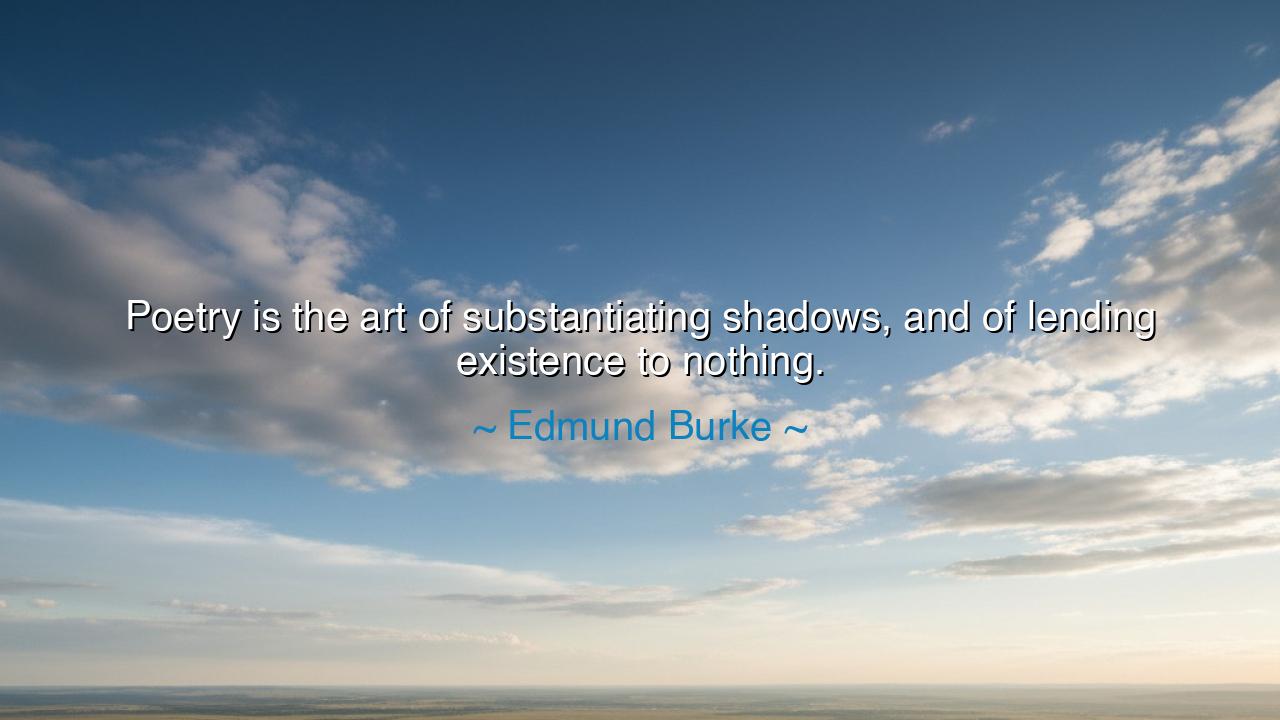
Poetry is the art of substantiating shadows, and of lending






Hear, O seekers of vision, the words of Edmund Burke, who declared: “Poetry is the art of substantiating shadows, and of lending existence to nothing.” In this utterance, he unveils the mystery of the poet’s craft: to take what is fleeting and unseen, what trembles only in the heart or in the half-light of memory, and to make it live. Poetry fashions reality out of dream, gives body to emotion, voice to silence, and presence to the invisible. It does not merely describe the world—it reveals the worlds that lie beyond the reach of reason.
For what are shadows but the outlines of things unseen in their fullness? They are hints, whispers, suggestions of forms too vast or too hidden for the eye to grasp. The poet takes these shadows and gives them weight and clarity. A sorrow too deep for ordinary speech becomes verse; a joy too fleeting for the hand to hold becomes song. In this way, poetry substantiates shadows—it makes the intangible tangible, gives flesh to what is otherwise only a passing impression in the mind.
And what is nothing, if not those feelings, hopes, and fears that defy material measure? Love, grief, wonder, despair—these are not stones we can hold or coins we can count, yet they shape our lives more than any physical thing. Poetry lends them existence, clothing them in words so that they may be seen, heard, remembered. Thus, poetry is the bridge between the invisible and the visible, the eternal and the temporal. Burke reminds us that in this power lies both beauty and danger, for to give life to nothing is also to summon ghosts, to awaken truths we may prefer to leave unspoken.
Consider the example of Dante Alighieri, whose Divine Comedy is nothing less than a substantiation of shadows. He took the vague terrors of sin, the mysteries of death, the hopes of paradise, and gave them form—Inferno, Purgatorio, Paradiso. In doing so, he lent existence to what was once only doctrine or dream. His poetry populated eternity with vivid figures, sights, and sounds, so that the invisible became unforgettable. Through him, shadows became substance, and nothing became a world.
History is full of such moments. Shakespeare, too, in his tragedies, conjured the intangible. What is Hamlet’s doubt, Macbeth’s ambition, Lear’s madness, but shadows of the human soul? And yet, through his poetry, they stand before us like living men. They were once invisible impulses, but he gave them bodies that still walk the stage centuries later. Here lies the truth of Burke’s words: poetry does not create new matter, but it transforms shadows into reality for the imagination.
This power is not confined to poets alone. In every human act of creativity, there is the substantiating of shadows. The painter takes the fleeting vision and gives it color. The musician gives sound to the silence between heartbeats. The leader gives shape to the dream of a people. But poetry, perhaps above all, makes visible what is invisible—whether a sigh, a memory, or a prophecy. That is why it endures: it is the alchemy that makes nothing into something eternal.
Therefore, O seekers of truth, let this be your lesson: do not despise the shadows within you. Do not think your fleeting thoughts, your subtle feelings, your whispers of wonder are too insubstantial to matter. For it is from such shadows that poetry is made, and in poetry they gain existence. Write, speak, or sing what lives in your silence, and you will find that your nothing is not nothing, but the seed of everything.
So remember Burke’s wisdom: poetry is the art of substantiating shadows and lending existence to nothing. This is no small thing—it is the work of giving form to the soul itself. And if you dare to live as a poet, whether in verse or in life, you too may take the shadows of your days and turn them into the light by which others may walk. For poetry is not illusion, but revelation of the unseen.






TDTran Tien Dat
I’m drawn to the imagery here—shadows, nothingness, existence. Burke makes poetry sound almost alchemical, transforming absence into presence. It makes me wonder if all art is a rebellion against emptiness, an effort to make meaning out of void. Does that mean poets are illusionists, or visionaries who can see what others can’t? Either way, it feels like a kind of sacred trickery.
VKTra Ngoc Van Khanh
This line fascinates me because it blurs the boundary between illusion and truth. If poetry gives existence to ‘nothing,’ then it’s an act of creation similar to divine imagination. It raises a question: is poetry valuable because it tells truth, or because it makes the unreal seem true? Maybe Burke saw art as a paradox—something false that reveals something real.
UGUser Google
I find this statement hauntingly beautiful. It captures what makes poetry so mysterious—its ability to give life to what can’t be touched or proven. Shadows and nothingness sound empty, yet through language, poets make them real. It makes me think about how much of human experience—love, grief, faith—is built from things we can’t see but still deeply feel. Maybe poetry is how we make those feelings tangible.
HKnguyen hoang khang
This quote feels like both a compliment and a critique of poetry. Burke seems to suggest that poets give form to the intangible—dreams, emotions, illusions. I love the idea that poetry substantiates shadows, making the invisible visible. But I also wonder if he’s implying that poetry deals in deception, creating meaning where none exists. Is he celebrating imagination, or questioning its honesty?